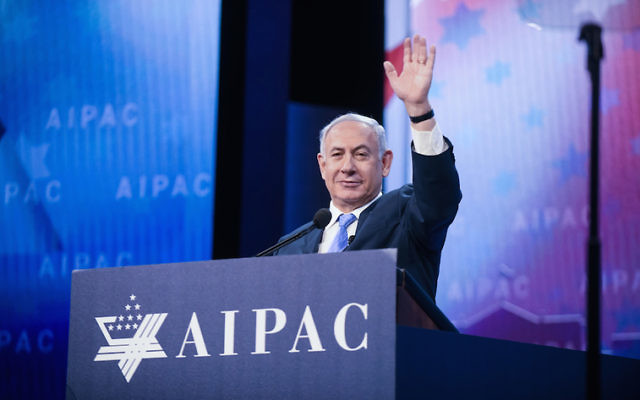Netanyahu’s call at AIPAC conference
Isolation is a thing of the past for Israel, the country's embattled Prime Minister declared in Washington's AIPAC conference last Tuesday, in a half-hour-long attempt to revive his fortunes.
ISOLATION is a thing of the past for Israel, the country’s embattled Prime Minister Benjamin Netanyahu declared in Washington’s AIPAC conference last Tuesday, in a half-hour-long attempt to revive his fortunes.
“Pretty soon the countries that don’t have relations with us, they’re going to be isolated,” Netanyahu declared in a speech, saying that Israel’s diplomatic ties are growing fast.
Embroiled in scandal investigations and a coalition crisis, the Israeli PM desperately hoped that an embrace from Donald Trump in the White House and from American Jewry at its largest pro-Israel conference would boost his standing at home.
The Netanyahus got the kudos they crave from the Trumps, even finding flowers for them waiting in Washington.
To Bibi’s delight, Trump said that he may head to Israel for the opening of the new US embassy in Jerusalem in May. Playing host to Trump would help his domestic popularity ratings – if he is still in office.
“We’re looking at coming. If I can, I will,” Trump said, going on to say: “Israel is very special to me. Special country, special people, and I look forward to being there.”
Netanyahu waxed lyrical about the embassy move, telling Trump that “the Jewish people have a long memory” and will remember him in the league of Cyrus and Lord Balfour.
The meeting represented a chance for Netanyahu to present himself as a world-class statesman – an image that is his big strength in fighting the popularity war in the face of scandal. After his White House meeting he stressed that Trump “shows great interest in my assessments” on Iran.
His message was that when Trump acts on Iran, Israeli advice will be guiding him. “Iran, Iran and Iran was the main topic of the meeting,” Netanyahu said. “In another 60 days the president has to make an important decision regarding the nuclear agreement.”
At the White House Netanyahu sent out a message that he is the quintessential statesman; at the The American Israel Public Affairs Committee (AIPAC) conference he wanted to be a superstar. He had a roomful of thousands of Israel supporters in the palm of his hand.
Netanyahu has probably never given a large-scale speech with so much audience interaction – he wandered around the stage to get closer to people, asked for audience responses via raising of hands, and asked questions.
At one point he demanded: “Who knows? Class?” The effect he wanted to create back home was clear – he wanted Israelis to conclude that American Jews love him, and ask themselves if they appreciate their PM enough.
He positioned himself as Mr Security, talking tough on Iran. “Darkness is descending on our region,” he said. “Iran is building an aggressive empire. Iran, Iraq, Syria, Lebanon, Gaza, Yemen, more to come.
“Now Iran is seeking to build permanent military bases in Syria, seeking to create a land bridge from Tehran to Tartus [in Syria] on the Mediterranean.
“And in addition to moving its army, its air force, its navy, to Syria to be able to attack Israel from a closer hand, it’s also seeking to develop, to build, precision guided missile factories in Syria, Lebanon, against Israel.
“I will not let that happen. We will not let that happen. We must stop Iran, we will stop Iran.”
There was also lots of feel-good content in his speech. He structured it as “the good, the bad and the beautiful.”
The “bad” was Iran and other “malevolent forces”. The “beautiful” was the Israel–America relationship, which he presented as thriving. And “good” was Israel’s success in expanding diplomatic ties and delivering life-changing technology and life-saving intelligence to the world.
“That plane could have been blown out of the sky if it weren’t for Israeli intelligence,” he said, seemingly referring to the case of Israel helping Australia to prevent an attack. He said: “You know, in the last few years Israel’s incredible intelligence services have foiled dozens, dozens of major terrorist attacks across the world in dozens of countries.”
Everything in the speech referred to Netanyahu’s big priorities in office: security, building diplomatic bridges, fighting the Iranian threat and trying to nurture the relationship with Washington.
He ended by saying that Israelis and Americans are now “writing a new chapter in our common story”.
This left people wondering whether Netanyahu will get to continue working on this new chapter, or whether this will turn out to be his farewell speech and he’ll be leaving the chapter as an unfinished work for someone else to complete.
NATHAN JEFFAY


comments